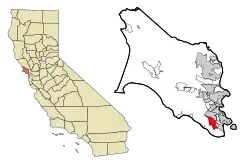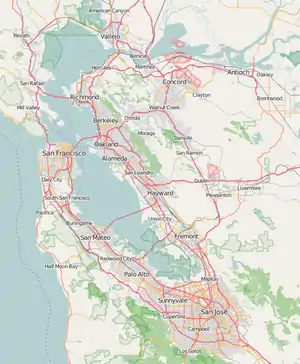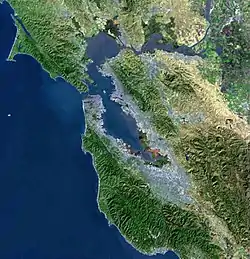Tamalpais-Homestead Valley, California
Tamalpais-Homestead Valley is a census-designated place (CDP) in Marin County, California, United States. The population was 11,492 at the 2020 census.[3]
Tamalpais-Homestead Valley | |
|---|---|
 Location in Marin County and the state of California | |
 Tamalpais-Homestead_Valley  Tamalpais-Homestead_Valley  Tamalpais-Homestead_Valley | |
| Coordinates: 37°53′46″N 122°32′35″W | |
| Country | |
| State | |
| County | Marin |
| Government | |
| • County Board | District 3 Kate Sears |
| • State Senate | Mike McGuire (D) |
| • Assembly | Stephanie Nguyen (D) |
| • U. S. Congress | Jared Huffman (D)[1] |
| Area | |
| • Total | 4.747 sq mi (12.29 km2) |
| • Land | 4.685 sq mi (12.13 km2) |
| • Water | 0.062 sq mi (0.16 km2) 1.31% |
| Population | |
| • Total | 11,492 |
| • Density | 2,452.93/sq mi (947.08/km2) |
| Time zone | UTC-8 (PST) |
| • Summer (DST) | UTC-7 (PDT) |
| ZIP code | 94941 |
| Area codes | 415/628 |
| FIPS code | 06-77805 |
Geography
Tamalpais-Homestead Valley is located at 37°53′19″N 122°32′23″W.[4] It is bordered by Mill Valley to the north and Sausalito to the southeast. It is about 10 minutes north of San Francisco and the Golden Gate Bridge by car. California State Route 1 (also known as Shoreline Highway and the Pacific Coast Highway) runs through the Valley and is the road most often used to access western Marin County. Nearby landmarks include the Golden Gate National Recreation Area, Mount Tamalpais State Park, Muir Woods National Monument, Tennessee Valley and Muir Beach.[5]
According to the United States Census Bureau, the CDP has a total area of 4.7 square miles (12 km2), of which 0.06 square miles (0.16 km2), or 1.31%, are water.[2]
Demographics
| Census | Pop. | Note | %± |
|---|---|---|---|
| 2010 | 10,735 | — | |
| 2020 | 11,492 | 7.1% | |
| U.S. Decennial Census[6] | |||
2010
At the 2010 census Tamalpais-Homestead Valley had a population of 10,735. The population density was 2,307.6 inhabitants per square mile (891.0/km2). The racial makeup of Tamalpais-Homestead Valley was 9,449 (88.0%) White, 91 (0.8%) African American, 24 (0.2%) Native American, 592 (5.5%) Asian, 28 (0.3%) Pacific Islander, 121 (1.1%) from other races, and 430 (4.0%) from two or more races. Hispanic or Latino people of any race were 499 people (4.6%).[7]
The census reported that 99.9% of the population lived in households and 0.1% lived in non-institutionalized group quarters.
There were 4,447 households, 1,516 (34.1%) had children under the age of 18 living in them, 2,458 (55.3%) were opposite-sex married couples living together, 312 (7.0%) had a female householder with no husband present, 149 (3.4%) had a male householder with no wife present. There were 234 (5.3%) unmarried opposite-sex partnerships, and 65 (1.5%) same-sex married couples or partnerships. 1,143 households (25.7%) were one person and 383 (8.6%) had someone living alone who was 65 or older. The average household size was 2.41. There were 2,919 families (65.6% of households); the average family size was 2.92.
The age distribution was 2,571 people (23.9%) under the age of 18, 345 people (3.2%) aged 18 to 24, 2,344 people (21.8%) aged 25 to 44, 3,964 people (36.9%) aged 45 to 64, and 1,511 people (14.1%) who were 65 or older. The median age was 45.5 years. For every 100 females, there were 94.4 males. For every 100 females age 18 and over, there were 92.2 males.
There were 4,703 housing units at an average density of 1,010.9 per square mile, of the occupied units 76.1% were owner-occupied and 23.9% were rented. The homeowner vacancy rate was 1.3%; the rental vacancy rate was 4.6%. 79.5% of the population lived in owner-occupied housing units and 20.4% lived in rental housing units.
2000
At the 2000 census there were 10,691 people, 4,558 households, and 2,803 families living in the CDP. The population density was 2,145.8 inhabitants per square mile (828.5/km2). There were 4,646 housing units at an average density of 932.5 per square mile (360.0/km2). The racial makeup of the CDP in 2010 was 85.0% non-Hispanic White, 0.8% non-Hispanic African American, 0.1% Native American, 5.5% Asian, 0.2% Pacific Islander, 0.3% from other races, and 3.4% from two or more races. Hispanic or Latino people of any race were 4.6%.[8]
Of the 4,558 households 28.9% had children under the age of 18 living with them, 51.5% were married couples living together, 6.9% had a female householder with no husband present, and 38.5% were non-families. 25.7% of households were one person and 5.4% were one person aged 65 or older. The average household size was 2.33 and the average family size was 2.80.
The age distribution was 20.1% under the age of 18, 3.4% from 18 to 24, 31.6% from 25 to 44, 35.7% from 45 to 64, and 9.2% 65 or older. The median age was 42 years. For every 100 females, there were 94.2 males. For every 100 females age 18 and over, there were 92.1 males.
The median household income was $102,094 and the median family income was $122,142. Males had a median income of $79,518 versus $60,058 for females. The per capita income for the CDP was $56,913. About 1.7% of families and 3.8% of the population were below the poverty line, including 3.1% of those under age 18 and 4.5% of those age 65 or over.
Education
Most of the CDP is in the Mill Valley Elementary School District. Some of it is in the Sausalito Marin City School District. All of it is in the Tamalpais Union High School District.[9]
References
- "California's 2nd Congressional District - Representatives & District Map". Civic Impulse, LLC. Retrieved March 8, 2013.
- "2021 U.S. Gazetteer Files: California". United States Census Bureau. Retrieved July 8, 2022.
- "P1. Race – Tamalpais-Homestead Valley CDP, California: 2020 DEC Redistricting Data (PL 94-171)". U.S. Census Bureau. Retrieved July 8, 2022.
- "US Gazetteer files: 2010, 2000, and 1990". United States Census Bureau. February 12, 2011. Retrieved April 23, 2011.
- Tamalpais Community Services District website
- "Census of Population and Housing". Census.gov. Retrieved June 4, 2016.
- "2010 Census Interactive Population Search: CA - Tamalpais-Homestead Valley CDP". U.S. Census Bureau. Archived from the original on July 15, 2014. Retrieved July 12, 2014.
- "U.S. Census website". United States Census Bureau. Retrieved January 31, 2008.
- "2020 CENSUS - SCHOOL DISTRICT REFERENCE MAP: Marin County, CA" (PDF). U.S. Census Bureau. Retrieved April 28, 2023. - Text list

